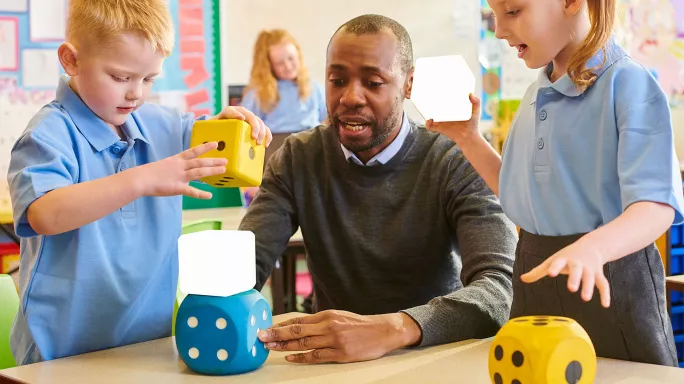
- Home
- Teaching & Learning
- Primary
- What primaries in poor communities need from Labour
What primaries in poor communities need from Labour

WeŌĆÖre supposed to be closing the gap, but we need the tools to do it,ŌĆØ says Andrew Jones, a primary headteacher on the Isle of Wight.
The neighbourhood his school serves is, according to the governmentŌĆÖs index of multiple deprivation, in the 10 per cent most deprived in the country.
ŌĆ£People always say, ŌĆśOh, beautiful, the Isle of Wight is lovely,ŌĆÖ but, actually, our community has so many challenges,ŌĆØ says Jones.
The Labour government has pledged to help schools like JonesŌĆÖ, through its mission to ŌĆ£break down barriers to opportunityŌĆØ. It has promised to ŌĆ£break the link between a childŌĆÖs background and their future successŌĆØ, through initiatives like free breakfast clubs and structural changes to the education system, such as reforming Ofsted.
As Tes reported last week, progress in this mission has been somewhat patchy since Labour came to power. While this is to be expected, given that the party is just one year in, for schools like JonesŌĆÖ, change canŌĆÖt come soon enough.
Challenges for schools in poor areas
The school is part of the INEOS Forgotten 40 Project, a charitable initiative that has been donating ┬Ż20,000 per year (across three years) to 100 UK primary schools, following a successful pilot with 20 schools that began in 2020.
The funding, which is given to schools serving some of the poorest parts of the UK, can be used as headteachers see fit, to help improve the lives of their pupils.
For Jones, it has been ŌĆ£absolutely essentialŌĆØ, in the current circumstances, to have ŌĆ£some funding that cannot be absorbed by the day-to-day school expensesŌĆØ.
However, the donation is a relatively small amount in school budget terms and there is so much more that primary schools serving poor areas say they need.
To understand more about the challenges they face, we asked five of the Forgotten 40 headteachers to share their messages to the government about what would truly help them to break down barriers to opportunities in their communities.
We have kept the headteachers anonymous, or changed their names, in order to protect the schools and the families they serve.
ŌĆśJust give me the money, give me the trustŌĆÖ
It was about 10 past nine when I got a message from the Year 6 teacher to come and remove a boy who was disturbing the maths lesson. He was being rude and angry and saying things like ŌĆ£maths is rubbishŌĆØ and ŌĆ£whatŌĆÖs the point?ŌĆØ.
Back in my office, I spoke to the boy and learned a bit more. On the way to school, heŌĆÖd had to drop off the bike heŌĆÖd got for Christmas at the house of a man, who was one of two unofficial money lenders the family had borrowed money from to buy presents.
When January had come and the first payment was due, the family couldnŌĆÖt make it. So the two men had come around to the house. One of them had beaten his dad up with a baseball bat and the other, in this little boyŌĆÖs words, had ŌĆ£slept with mum on the sofa in the loungeŌĆØ.
Surprise, surprise, he wasnŌĆÖt that interested in his maths lesson that morning.
IŌĆÖm over the fact that the support is not there and that all the services are reduced and harder to get. ThereŌĆÖs no point in me moaning about that.
Our school is the hub of the community. We know our families inside out and back to front. We know what they need, and they trust us. If it was up to me, and I could do anything, I would have a family centre based in my school building.
Just give me the money, give me the trust, and I will find those services that the families need. IŌĆÖll bring the counsellors in and the domestic abuse support workers. IŌĆÖll get the health visitors and the speech therapist. ThatŌĆÖs what weŌĆÖre already doing, but weŌĆÖre doing it in a piecemeal way.
I know a lot of headteachers would balk at that idea, and itŌĆÖs not needed in all schools by any means, but for some schools it would be absolutely life-changing.
There are things that our families do that are infuriating, but we have to understand their lived experiences and how they got to the place that theyŌĆÖre in now.

╠²
The one thing that is never in question is that the love they have for their children is real, and what they want for their children is positive. They just donŌĆÖt have the skills or the confidence to do what needs to be done.
The writer is headteacher at a primary school in the East Midlands
ŌĆśOfsted is not comparing like for likeŌĆÖ
Everything we do to get our children ready to learn doesnŌĆÖt happen by accident. It takes a great deal of effort, energy, finance, capacity, planning, time and strategy.
Last year we had children coming into Reception with complex needs that we werenŌĆÖt set up to meet. Unfortunately, there wasnŌĆÖt a pathway to specialist provision within the town and, knowing the situations of the families, sending their children out of town would not have been appropriate.
So we worked in the six-week summer holidays to develop a facility ourselves. WeŌĆÖve got a lean-to shed that weŌĆÖve made into a soft play and sensory space, and weŌĆÖve turned what used to be our meeting room into what we call the ŌĆ£rainbow roomŌĆØ, where we now teach six youngsters who have complex needs or are non-verbal.
The provision is not brilliant, but itŌĆÖs worked out really well.
What really bothers me is that this work isnŌĆÖt being measured. Take the new draft Ofsted framework, for example. Where is the acknowledgement of context?
If the context of our school was that we had 5 per cent pupil premium children, as the headteacher I could work with those children and get them to age-related expectations. But we have 70 per cent pupil premium in this school, and not all pupil premium children are the same. They come from very different backgrounds and have very different characteristics.
Our pupil premium outcomes actually surpass national pupil premium outcomes, but it takes a lot to get there.
ItŌĆÖs the same with special educational needs and disabilities (SEND). Before you even consider the educational need, you need to think about what else that child is facing. Are they on free school meals? Are they known to social services? Do they have three or more adverse childhood experiences? Are they in a separated family? Have they been flagged by [a scheme that informs schools about police-attended domestic abuse incidents]? In our school, 15 per cent of children have got all of those contributing characteristics.
Or think about attendance. Why are we comparing school attendance to national attendance? Yes, my schoolŌĆÖs attendance is below national, but our proportion of pupil premium is above national and our proportion of SEND is above national. YouŌĆÖre not comparing like for like.
It all goes back to context. This is where we should be starting from, and this is what Ofsted, in my opinion, have had wrong for so long.
The writer is headteacher at a primary school in the North East of England
ŌĆśMy school couldnŌĆÖt be more inclusive than it isŌĆÖ
I set up a free breakfast club, long before the government did, using money from INEOS initially. We target a number of families to come in, and it makes a real difference to them because it gives them the time they need to unpick some of the problems theyŌĆÖre facing.
For those children and their families, school is the only place they can get that. There are no other services where thereŌĆÖs a shop front door that allows you to actually talk to someone and know that you wonŌĆÖt be turned away. We are the only bastion of consistent support.
And weŌĆÖve got some very poor families. Off the top of my head, for example, I can think of a family who have got seven children in a two-bedroom flat.
Our role as teachers who just deliver learning has significantly changed in recent years. We are now acting as social conduits to try to point people in the right direction to get the support they need.
WeŌĆÖve also seen such a significant rise in SEND. The government is telling us that we need to be more inclusive, but I donŌĆÖt know how my school could be any more inclusive than it already is.

╠²
In terms of what would help, infrastructure around schools, particularly in deprived communities, needs to be stronger. There needs to be more investment into early help and social care. For us to be able to teach, the environmental situation of these children needs to be stable and, right now, we are the only stabilising factor.
But we canŌĆÖt do it on our own. We canŌĆÖt afford to. The stone is being squeezed of too much blood. Whereas weŌĆÖve seen poverty increase, weŌĆÖre not seeing any increase in our budget in real terms.
Schemes like the governmentŌĆÖs free breakfast clubs are great, but the issue is schoolsŌĆÖ capacity to deliver those extra services.
My teachers and staff are brilliant. They donŌĆÖt stick to the hours, ever. But thereŌĆÖs only so much you can ask of them, and anyone out of education who doesnŌĆÖt understand how intensive the actual teaching role is needs to have a long, hard look at it.
Andrew Jones is a primary headteacher on the Isle of Wight
ŌĆśWhat we need is support for the parentsŌĆÖ
This is a place where children donŌĆÖt travel far from the school. The aspiration side of it can, therefore, be quite tricky. ItŌĆÖs just a constant thing on the agenda of trying to show them the world.
You have to start from what they know, and that can be very little. They might not have been to a zoo or to the seaside, so you canŌĆÖt start talking about those things, assuming that they have.
It goes beyond poverty. If you come to work at a school like ours, you assume there will be difficulties with funding and paying for school trips, for instance. But you donŌĆÖt think about the fact that the children will never have had certain experiences before in their lives.
Our job is to make sure that doesnŌĆÖt become a barrier. We canŌĆÖt make excuses and say that children donŌĆÖt read at home because they havenŌĆÖt got books at their house. Well, what are we going to do about it?
What we need from the government is not more support for us as a school, but support for the parents. We can do our very best, and signpost adults to services and protect their children, knowing what we know about whatŌĆÖs going on in their homes - but we canŌĆÖt fix it all.
Everything is pushed to schools to fix, and a lot of it needs to be fixed with the adults, so that adults can properly parent their children and allow us to teach.
The other big thing for us, and it will be the same for every school, is the level of SEND. I love that weŌĆÖve got a diverse range of pupils in school, and it does everybody good to have children with SEND here. But IŌĆÖve got nowhere near enough funding to be able to support them, which means IŌĆÖm going into a bigger deficit year on year.
If the government wants all pupils with SEND to be in mainstream schools, thatŌĆÖs fine, but theyŌĆÖve got to let us resource that properly and staff that properly. And right now, I really canŌĆÖt.
The writer is headteacher at a primary school in the North of England
ŌĆśThere is a compounding of povertyŌĆÖ
I was headteacher at a school in the North East of England for 11 years, and 51║┌┴Ž took up the vast majority of my time.
A lot of our parents genuinely struggled. I remember going to phone one parent, and the child saying to me, ŌĆ£Oh, she might get a bit nervous and not answer because she doesnŌĆÖt like talking on the phone.ŌĆØ Those kinds of parental anxieties can really restrict a child.
For example, the way the health system is organised means that if a parent doesnŌĆÖt attend an appointment, their child will just be taken off the list, without any follow-up. Sometimes, I would put a referral in for an appointment for physio or for speech and language assessment, but then the parent wouldnŌĆÖt go and the child would have to go back to the start of the queue.
What you have, then, is a compounding of poverty. You have a child who really needs help, but the parentŌĆÖs struggling to meet that need and the system isnŌĆÖt providing for them either.
In terms of what would help, there are probably two things.
There needs to be an allowance within our system for children who have not had what you might call a ŌĆ£typicalŌĆØ childhood experience, because there isnŌĆÖt any concession for that within the curriculum expectations and the Ofsted inspection framework as they currently stand.
The other thing that I think should happen is a recognition of all the work that schools are doing in terms of childrenŌĆÖs health and social care. The expectations around that have increased massively in the past 10 years.
Schools are there for children. TheyŌĆÖve got a real heart for their holistic development. They will get involved in dealing with everything to do with that childŌĆÖs life. But it almost seems that education is becoming second fiddle to some of these other priorities.
I have colleagues who think thatŌĆÖs wrong and we should focus purely on education, but I think schools are probably really well-placed to do this work. WeŌĆÖve got the existing relationships with families. WeŌĆÖve got the day-to-day interaction with the children.
But if that work is going to continue, there needs to be a funding recognition and a policy recognition that it is happening. Teachers are ideally placed to do this, but they need to be trusted and empowered to do it.
With that trust probably comes a little bit of money, as well as getting rid of all the red tape. And you say, ŌĆ£Look, we trust you in this. We want you to crack on and make a difference.ŌĆØ
The writer is a former headteacher, based in the North East of England
You can now get the UKŌĆÖs most-trusted source of education news in a mobile app. Get Tes magazine on and on
topics in this article



